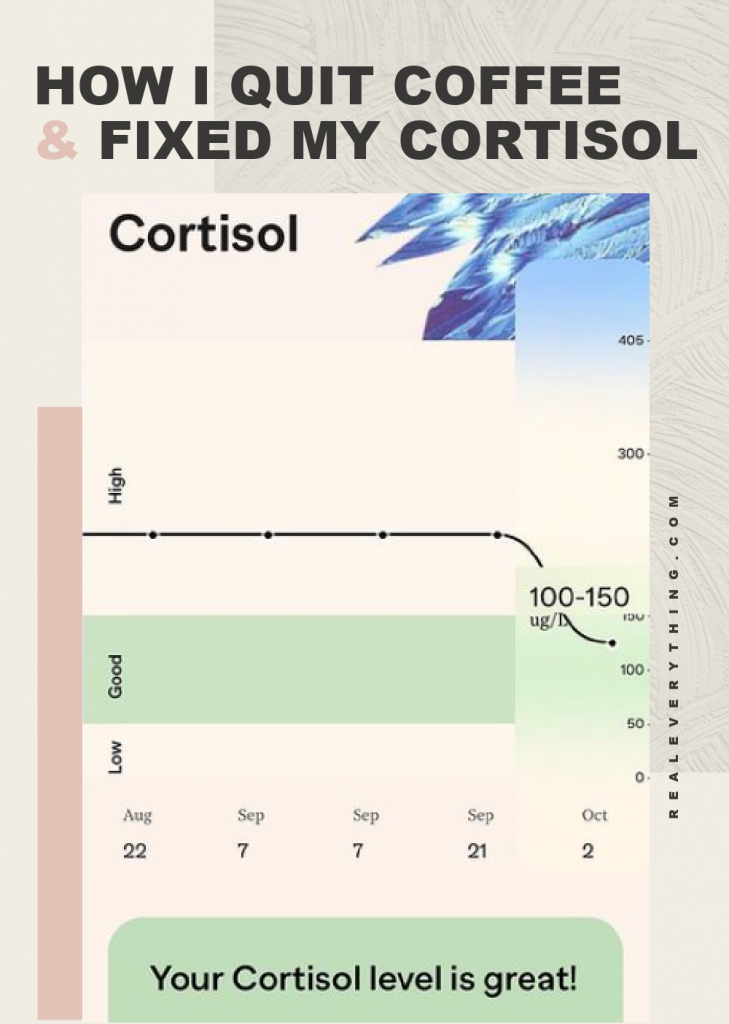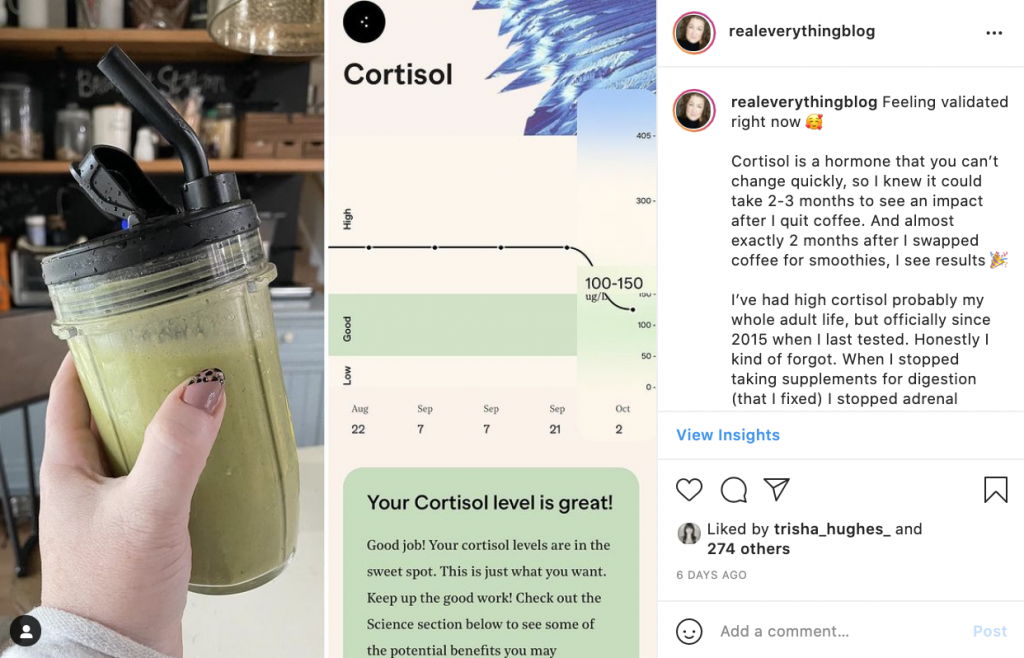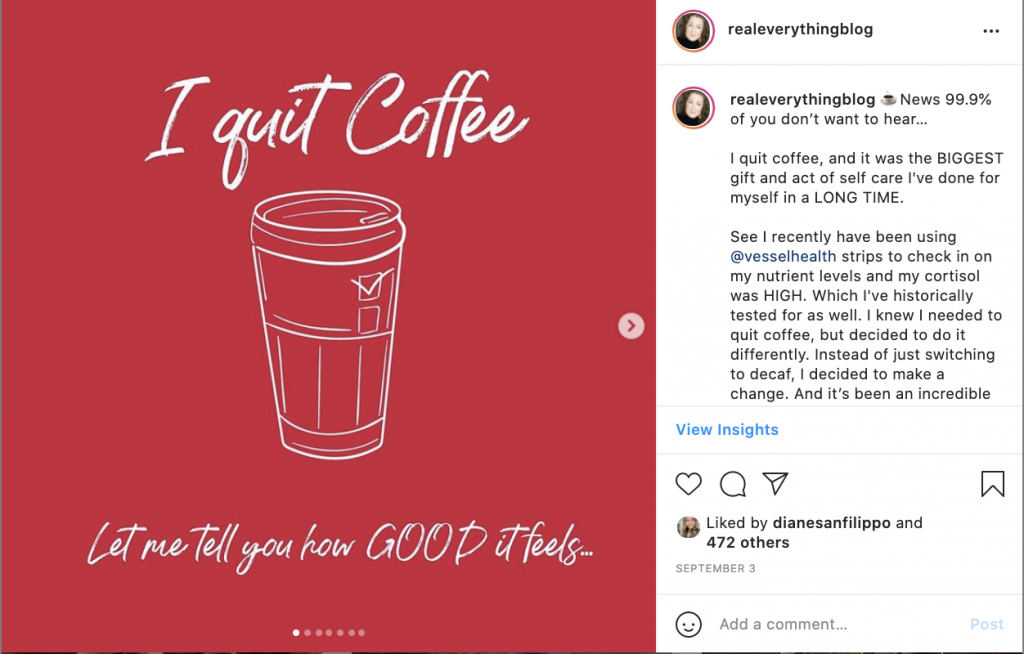I know, I know, it’s news no one wants to hear. But, I quit coffee, and it was the BIGGEST gift and act of self care I’ve done for myself in a LONG TIME. I do so much for my health, especially my immune health – yet my high cortisol was sabotaging all that effort. One simple solution changed everything.
See I started using these (use code WHOLEVIEW for 20% off) at-home tests to check on my nutrient levels and one of the things it reported was HIGH cortisol. Which I’ve historically tested for as well. I knew I needed to quit coffee, but decided to do it differently. Instead of just switching to decaf, I decided to make a change. And it’s been a game changer!

Why does high cortisol matter?
Cortisol is a hormone that you can’t change quickly, so I knew it could take 2-3 months to see an impact after I quit coffee. And almost exactly 2 months after I swapped coffee for smoothies, I see results, woot!
I’ve had high cortisol probably my whole adult life, but officially since 2015 when I last tested. Honestly I kind of forgot. When I stopped taking supplements for digestion (that I fixed) I stopped adrenal support, too. Since I’m working on tweaking my health challenges as a result of Long Hauler’s, I knew it was time I prioritize this to alleviate the stress on my immune system.
Cortisol, the primary stress hormone, increases sugars (glucose) in the bloodstream, enhances your brain’s use of glucose and increases the availability of substances that repair tissues. Cortisol also curbs functions that would be nonessential or harmful in a fight-or-flight situation. It is a steroid hormone that regulates a wide range of vital processes throughout the body, including metabolism and the immune response.
All the effort I make towards health really can’t have an impact if my body is literally unable to prioritize immune support, since it’s in flight or fight mode.
Immune Function & Caffeine
Having elevated cortisol is literally limiting your body’s ability to function properly. Immune and metabolism are sacrificed as your body is in a constant state of “chasing wild beasts.”
And, since “Caffeine in dietary doses increases both adrenocorticotropin and cortisol secretion in humans. Caffeine’s effect on glucocorticoid regulation therefore has the potential to alter circadian rhythms and to interact with stress reactions.”
That is why, when I tested high for cortisol, I decided the first action I’d take was to quit coffee.
Let me be clear – I did NOT drink a lot of caffeine because I already knew it was problematic for me. I had 5-6 cups a week. If I had a large coffee I always got half-caff(einated).
I quit caffeine
It sounds sad, and impossible – but trust me, you can do this (if you want or need to). It was easier than I thought, and I felt SO much better once my body adapted. Here’s what happened:
- Since I’m not making my coffee with collagen and cream anymore, I got hungry. I’m now eating a nourishing breakfast.
- Instead of forcing myself to wind down at midnight, I am now putting myself to bed before the teens and energetic throughout the day.
- I’m finding my energy to be more stable which leads me to be more intentional with my movement and making time for exercise and self care. I haven’t wanted to for so long.
- My moods are more stable which let’s be honest is best for everyone!
Listen, I didn’t want to let go either. But if you’re suffering from fatigue, insomnia, sleep issues, cravings, mood swings, anxiety or general weirdness, I encourage you to consider trying, and not giving in to crutches.

Crutches
The number one question I get asked: why not just switch to decaf. Have you tried replacing coffee with ____.
Here’s the thing, if you lean on a crutch, your body will just continue to maladapt. Ride the wave of exhaustion. Maybe plan this around the holidays when you can take naps during the day. But if you just swap one crutch for another – you won’t make qualitative change to the root cause issue.
My biggest suggestion? When you want sugar, take a nap. When you want want decaf take a nap. Want tea, take a nap. Seriously, your body is giving you those cues because it’s telling you it’s tired. Sleep is the only way to get over the slump to normalized energy on the other side!
Now that’s it’s been a few months I will occasionally (1-2x/week) have decaf coffee or tea, but always with food!
What else I did
So, what did I do? Well, considering all the dietary restrictions and work I’ve been doing for over a decade, I wanted to replace that morning coffee with nourishment. We’d podcasted about the importance of breakfast and I’d hoped to have more desire for it without coffee with protein (collagen) and fats (cream).
I ordered myself Kencko sustainable, organic smoothie packets and had one each morning in lieu of coffee. This allowed me to still get my daily collagen, to add 3.5 servings of fruits & veggies to my day, and it was still a drink so not forcing myself to eat.
After a few weeks, as my energy stabilized, so did my hunger cues. I knew before my cortisol showed on a test that it was improving because I could feel my metabolism shift, it was waking up in the mornings for the first time in a long time.
That meant I ate lunch at a normal hour, and my body wasn’t trying to “catch up” at night. So I craved less in the evenings. My body naturally tapered off in the evenings, knowing how much sleep I truly needed – for the first time perhaps in my whole life.
I was going to bed truly getting 8-9 hours of solid sleep each night as a result.
And not to mention, my desire to hydrate with different sources throughout the day shifted. Instead of wanting coffee and then craving decaf later – I started loving mineral water. An electrolyte source of energy for my body that was nourishing it with minerals, instead of dehydrating it with coffee.
So while my singular goal was to simply quit coffee, I ended up as a result:
- drinking more water
- going better sleep
- eating more fruits & veggies
Considering my cortisol is now “normal”, I’d say that’s a HUGE win-win!
Test, don’t guess
I cannot recommend enough that you TEST instead of guess on your health. A lot of people assume they have adrenal issues, but knowing if your cortisol is high or low or actually fine makes a huge difference. Maybe your energy concerns are related to thyroid or something else.
If you’re looking to optimize or simply not feel badly, knowing what you need to work on is critical. I feel so empowered, and proud – if I’m being honest. It wasn’t easy, but I did it for ME and you can too!
I discuss this more in the comments on this post, too.

Want more info on our Real Life? Healthy recipes, parenting tips, and general lifestyle stuff goes out in our Real Everything newsletter, join here.
Never want to miss a post, sale, or deal? Join my Healthy Inside & Out e-mail list for more info on non-toxic living and safer skincare!




